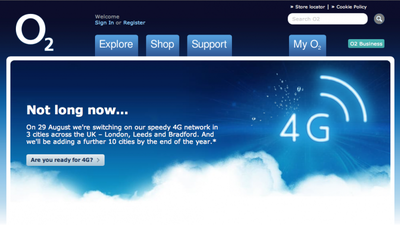O2 has become the second British carrier alongside EE to announce high-speed 4G services, which are due to be launched at the end of the month. The rollout, which will initially cover London, Leeds and Bradford, will start on August 29, with a further 10 cities due to be added by the end of the year.

4G price plans will start from around £26 ($39) a month and O2 is already offering several 4G-enabled phones, including the Samsung Galaxy S4, the HTC One and the Blackberry Z10. As O2 has snapped up the 800 MHz spectrum, the new network will not be compatible with the iPhone 5, as the device operates on different spectrums. However, the CEO of Telefónica UK (the parent company of O2), told the BBC that he "would be frankly gobsmacked if their [Apple] roadmap didn't address that issue", suggesting that future models will support the new network.
Due to issues with Ofcom, the UK telecommunications regulator, and the delayed switch-off of the old analog television networks (the new 4G networks now operate within these frequencies), the rollout of faster LTE networks in the UK has been plagued with delays. EE, a joint subsidiary between Orange S.A. and Deutsche Telekom, was the first to roll out 4G networks back in August 2012, and its network already covers most of the UK's major towns and cities, with improvements being made daily.
EE has stated that by the end of 2014 its network will cover up to 98% of the UK population (around 62 million people). The 4G auction back in February 2013, which raised around £2.3 billion ($3.5 billion) for the UK government, awarded spectrum for 4G services to the four major UK carriers plus BT, one of the largest telecommunications operators in the UK. Both Vodafone and 3, two other British carriers, have yet launch their 4G networks, although Vodafone expects its network to go online "later this year", which may well coincide with an Apple iPhone announcement expected around September.
























Top Rated Comments
The problem was not the lack of 4G/LTE in the UK at the time those iPads were sold. Maybe the guy you were replying to expected the ghost of Jobs to erect a 4G mast in his village, but that's not why the ASA upheld the complaints.
The problem was that those iPad models are never going to work with 4G/LTE in the UK because they can only use the North American 4G/LTE frequencies. Plans for UK 4G/LTE networks were well advanced at the time and were due to launch well within the useful life of an new iPad - Apple knew damn well that the iPad wouldn't work with those services, yet they went ahead and sold it as the "iPad 4G".
If you are a lucky resident of London, Leeds or Bradford (or if you live in an area that has had 4G coverage from EE for some months now) you might reasonably expect the "iPad 4G" you paid £600+ for a year ago to work with the new service. It won't. That is not cool (fortunately the media picked up on it fairly quickly so not too many people will have been fooled).
No. An "iPad 4G" that actually supported the 4G frequencies that had already been chosen virtually everywhere outside North America would have been best - even if UK folk had to wait 6 months before they could use it.
Failing that, not plastering "4G" in large friendly letters over the packaging and advertising would have been an improvement (it was all localised for the target countries anyway, so there's no excuse for not).
The ASA is nothing to do with the British government nor is it a legal body. It is the advertising industry's own system of voluntary self regulation.